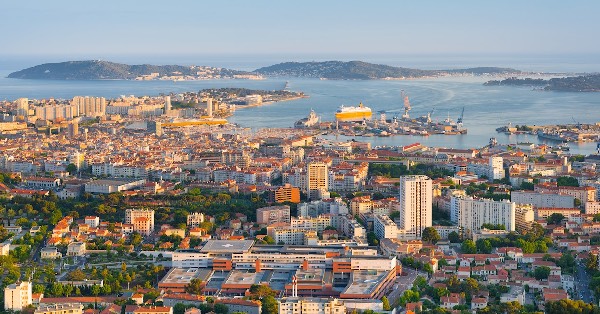- ABB leads consortium providing shore-to-ship power connection for ferries and cruise ships in Port of Toulon
- ABB’s shore connection technology enables cutting emissions and noise during port stays
- Future-proof onshore energy storage system allows managing fluctuations in energy demand of the local grid and drawing on emerging renewable energy sources
Port of Toulon, which handles over 1.6 million ferry and cruise passengers annually, has committed to ABB Shore Connection technology at a key stage in its sustainability drive.
With around 1,300 yearly calls from ferries and cruise vessels right in the heart of the city, the port of Toulon plays an important role in developing the attractiveness of the region for business and tourists. The port is also central to the “Zero-smoke stopovers” plan by the region of Provence-Alpes-Côte d’Azur (Région Sud PACA), which aims to electrify the docks of Toulon, Marseille and Nice to enable emission-free stays for vessels1.
Shore-to-ship power connections allow ships to turn off diesel generators during port calls. For shipowners, this means savings on fuel and maintenance costs while switching to cleaner and more sustainable energy. Cruise and ferry passengers, as well as local residents benefit not only from cleaner air, but also from less noise and vibrations generated when ships are docked.
“Toulon is the first Mediterranean port to supply power to all of its docks. This is an innovative project built on an intelligent energy flow management system with a unique energy mix. With the support of ABB as well as the Région Sud PACA and our partners, we are significantly improving air quality in the port, while maintaining business activity. The shore-to-ship power connection will eliminate more than 80 percent of pollutant emissions. It will also save 9,000 hours of vessels running on diesel annually. For the ferry activity in the city of Toulon alone, this adds up to a reduction in sulfur emissions equivalent to those of 50,000 cars in a year,” said Hubert Falco, President of the Toulon Provence Méditerranée Metropolis.
“Technically, this project is developing a new, intelligent smart grid power network using digital technology to manage energy flows from several interconnected sources. The infrastructure makes it possible to optimize overall energy efficiency while limiting the carbon footprint,” said Frédéric Mestivier, designer and technical director of the power project for the Toulon Provence Méditerranée Metropolis.
ABB is leading the consortium selected to manage and execute this turnkey project, with commissioning due in 2023. The ABB solution will be capable of delivering enough energy to cover the needs of three ferries calling to port simultaneously, or one cruise ship. Vessels will have the possibility of 50 or 60Hz power connections. As part of the consortium, Eiffage Construction will carry out the civil engineering work, and Fauché will be responsible for installing and connecting the equipment.
Through the innovative design established by the Toulon Provence Méditerranée Metropolis, the system implemented with ABB equipment will have the ability to automatically adjust the energy mix to supply vessels through the local power network (Enedis), with solar energy produced from a photovoltaic shelter, as well as an energy storage system made up of lithium batteries. The system will help to smooth consumption peaks while allowing the storage of excess solar energy production. It will also be able to use other renewable energy sources such as fuel cells, as they become available.
“We are honored to have been selected by Toulon Provence Méditerranée Metropolis to work on this innovative project,” said Jyri Jusslin, Head of Service, ABB Marine & Ports. “We commend the Toulon authorities for grasping this opportunity. It sets a course for a more sustainable future with smart systems that already exist today.”
Sustainable transportation, including marine and inland vessels, will play an important role in the goal set by France to achieve carbon neutrality by 2050 in accordance with the climate plan announced in 2017.
Worldwide, ferries transport around four billion passengers and 370 million vehicles every year, according to trade association Interferry2. The International Maritime Organization has adopted a strategy to reduce annual emissions by at least 40 percent by 2030 and 70 percent by 2050, and the passenger transport is under pressure to achieve these targets.
As a leader in electric shipping and smart port technology, ABB offers comprehensive shore connection solutions comprising state-of-the-art infrastructure both onshore and on board vessels. ABB’s shore-to-ship power technology has already been integrated by over 50 ports around the world to support the objective of reduci









































